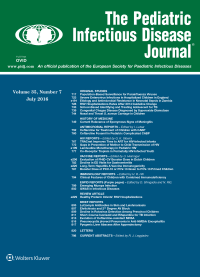
Elevated Immune Response Among Children 4 Years of Age With Pronounced Local Adverse Events After the Fifth Diphtheria, Tetanus, Acellular Pertussis Vaccination
Background:
In the Netherlands, acellular pertussis vaccines replaced the more reactogenic whole-cell pertussis vaccines. This replacement in the primary immunization schedule of infants coincided with a significant increase in pronounced local adverse events (AEs) in 4 years old children shortly after the administration of a fifth diphtheria, tetanus, acellular pertussis and inactivated polio (DTaP-IPV) vaccine. The objective of this study was to investigate possible differences in vaccine antigen-specific immune responses between children with and without a pronounced local AE after the fifth DTaP-IPV vaccination.
Methods:
Blood was sampled in 2 groups of 4-year-olds: a case group reporting pronounced local swelling and/or erythema up to extensive limb swelling at the injection site (n = 30) and a control group (n = 30). Peripheral blood mononuclear cells were stimulated with individual vaccine antigens. Plasma antigen-specific IgG, IgG subclass and total IgE concentrations and T-cell cytokine [interferon-gamma, interleukin (IL)-13, IL-17 and IL-10] production by stimulated peripheral blood mononuclear cells were determined by multiplex bead-based fluorescent multiplex immunoassays.
Results:
In children with AEs, significantly higher total IgE and vaccine antigen-specific IgG and IgG4 responses as well as levels of the T-helper 2 (Th2) cytokine IL-13 were found after pertussis, tetanus and diphtheria stimulation compared with controls.
Conclusions:
Children with pronounced local reactions show higher humoral and cellular immune responses. Acellular vaccines are known to skew toward more Th2 responses. The pronounced local AEs may be associated with more Th2 skewing after the fifth DTaP-IPV vaccination, but other biologic factors may also impact the occurrence of these pronounced local reactions.
In the Netherlands, acellular pertussis vaccines replaced the more reactogenic whole-cell pertussis vaccines. This replacement in the primary immunization schedule of infants coincided with a significant increase in pronounced local adverse events (AEs) in 4 years old children shortly after the administration of a fifth diphtheria, tetanus, acellular pertussis and inactivated polio (DTaP-IPV) vaccine. The objective of this study was to investigate possible differences in vaccine antigen-specific immune responses between children with and without a pronounced local AE after the fifth DTaP-IPV vaccination.
Methods:
Blood was sampled in 2 groups of 4-year-olds: a case group reporting pronounced local swelling and/or erythema up to extensive limb swelling at the injection site (n = 30) and a control group (n = 30). Peripheral blood mononuclear cells were stimulated with individual vaccine antigens. Plasma antigen-specific IgG, IgG subclass and total IgE concentrations and T-cell cytokine [interferon-gamma, interleukin (IL)-13, IL-17 and IL-10] production by stimulated peripheral blood mononuclear cells were determined by multiplex bead-based fluorescent multiplex immunoassays.
Results:
In children with AEs, significantly higher total IgE and vaccine antigen-specific IgG and IgG4 responses as well as levels of the T-helper 2 (Th2) cytokine IL-13 were found after pertussis, tetanus and diphtheria stimulation compared with controls.
Conclusions:
Children with pronounced local reactions show higher humoral and cellular immune responses. Acellular vaccines are known to skew toward more Th2 responses. The pronounced local AEs may be associated with more Th2 skewing after the fifth DTaP-IPV vaccination, but other biologic factors may also impact the occurrence of these pronounced local reactions.
Keywords: T-helper 2 skewing; acellular pertussis booster vaccination; children; immune response; pronounced adverse events
Document Type: Research Article
Publication date: 01 September 2017
- Access Key
- Free content
- Partial Free content
- New content
- Open access content
- Partial Open access content
- Subscribed content
- Partial Subscribed content
- Free trial content